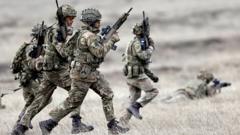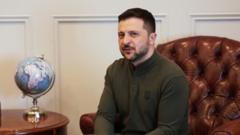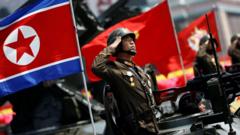As winter approaches, Ukraine’s energy infrastructure is under severe attack from Russia, leading citizens to adapt in innovative ways while engineers tirelessly strive to keep power flowing amidst mounting challenges.**
Ukraine's Energy Crisis: Resilience Amidst Russian Onslaught**

Ukraine's Energy Crisis: Resilience Amidst Russian Onslaught**
With winter looming, Ukrainians face relentless attacks on their energy infrastructure, igniting a spirit of innovation and community resilience.**
In the face of intensifying Russian assaults targeting Ukraine's energy infrastructure, the nation is determined to maintain its power supply as it braces for another harsh winter. Inside a battered thermal power station, where dark patches of oil stain the ground and walls are riddled with craters from missile strikes, engineers are working furiously to repair damaged systems. Amid these turbulent conditions, snow collects on the floor, a stark reminder of the season ahead.
Russian forces have ramped up their campaign, with the recent escalation marking the second major wave of attacks within two weeks. By mid-November alone, Ukraine had already lost approximately 9 gigawatts of generating capacity—nearly half of what was needed during peak winter demands last year. Despite the grim landscape, optimization efforts continue, though security protocols prevent the sharing of specific locations and damage assessments.
The resolve of Ukrainian engineers is palpable. Workers like Oleksandr express the challenges they face: “We don’t even have time to restore the main equipment, let alone the roof and walls. Everything gets destroyed again from one strike to the next.” Fortunately, they have support from the West. Recent financial aid, amounting to £89 million from the European Commission and the US, aims to enhance repair efforts and provide vital equipment protection.
As the engineers toil on the energy front lines, citizens are adapting to life amidst the blackouts. Streets in cities are alive with the sound of generators, substituting for the absent electricity; shopfronts gleam under bright lights despite widespread outages. Residents of residential buildings are showcasing ingenuity, with some communal efforts leading to the installation of backup power systems that restore elevators and hot water access—all essential comforts in the frigid winter months.
Inside an apartment in Kyiv's Pozniaky district, Nataliya Andriyko shares her relief at having lift access thanks to a neighborhood system designed to ease power cuts. “It’s a bizarre feeling," she shares, "especially when you realize how grateful you are for basic needs being met.” Narrating her experience with fellow residents building a sense of community, she notes, “Together, we’re strong.”
The reality of power outages permeates daily life, prompting individuals to stay vigilant about energy availability while pooling resources for alternative solutions such as generators and solar batteries. This collective struggle has inspired filmmakers, with a new comedy titled "Zbory OSBB" slated for release. The film humorously showcases the friction that arises when residents debate purchasing a generator, reflecting the delicate balance of community dynamics during transition.
Writer Ivan Melashenko mentions that, despite the tension, humor naturally evolves from their shared experiences in the face of adversity. As the war drags on, he emphasizes the need for positivity, saying, “People need this,” hinting at the blend of seriousness and light-heartedness as the population navigates their tumultuous reality.
The backdrop of conflict remains, yet the resilience and innovation of Ukrainians shine bright—providing strength against the relentless winter chill and the destructive assaults of conflict.
Russian forces have ramped up their campaign, with the recent escalation marking the second major wave of attacks within two weeks. By mid-November alone, Ukraine had already lost approximately 9 gigawatts of generating capacity—nearly half of what was needed during peak winter demands last year. Despite the grim landscape, optimization efforts continue, though security protocols prevent the sharing of specific locations and damage assessments.
The resolve of Ukrainian engineers is palpable. Workers like Oleksandr express the challenges they face: “We don’t even have time to restore the main equipment, let alone the roof and walls. Everything gets destroyed again from one strike to the next.” Fortunately, they have support from the West. Recent financial aid, amounting to £89 million from the European Commission and the US, aims to enhance repair efforts and provide vital equipment protection.
As the engineers toil on the energy front lines, citizens are adapting to life amidst the blackouts. Streets in cities are alive with the sound of generators, substituting for the absent electricity; shopfronts gleam under bright lights despite widespread outages. Residents of residential buildings are showcasing ingenuity, with some communal efforts leading to the installation of backup power systems that restore elevators and hot water access—all essential comforts in the frigid winter months.
Inside an apartment in Kyiv's Pozniaky district, Nataliya Andriyko shares her relief at having lift access thanks to a neighborhood system designed to ease power cuts. “It’s a bizarre feeling," she shares, "especially when you realize how grateful you are for basic needs being met.” Narrating her experience with fellow residents building a sense of community, she notes, “Together, we’re strong.”
The reality of power outages permeates daily life, prompting individuals to stay vigilant about energy availability while pooling resources for alternative solutions such as generators and solar batteries. This collective struggle has inspired filmmakers, with a new comedy titled "Zbory OSBB" slated for release. The film humorously showcases the friction that arises when residents debate purchasing a generator, reflecting the delicate balance of community dynamics during transition.
Writer Ivan Melashenko mentions that, despite the tension, humor naturally evolves from their shared experiences in the face of adversity. As the war drags on, he emphasizes the need for positivity, saying, “People need this,” hinting at the blend of seriousness and light-heartedness as the population navigates their tumultuous reality.
The backdrop of conflict remains, yet the resilience and innovation of Ukrainians shine bright—providing strength against the relentless winter chill and the destructive assaults of conflict.






















